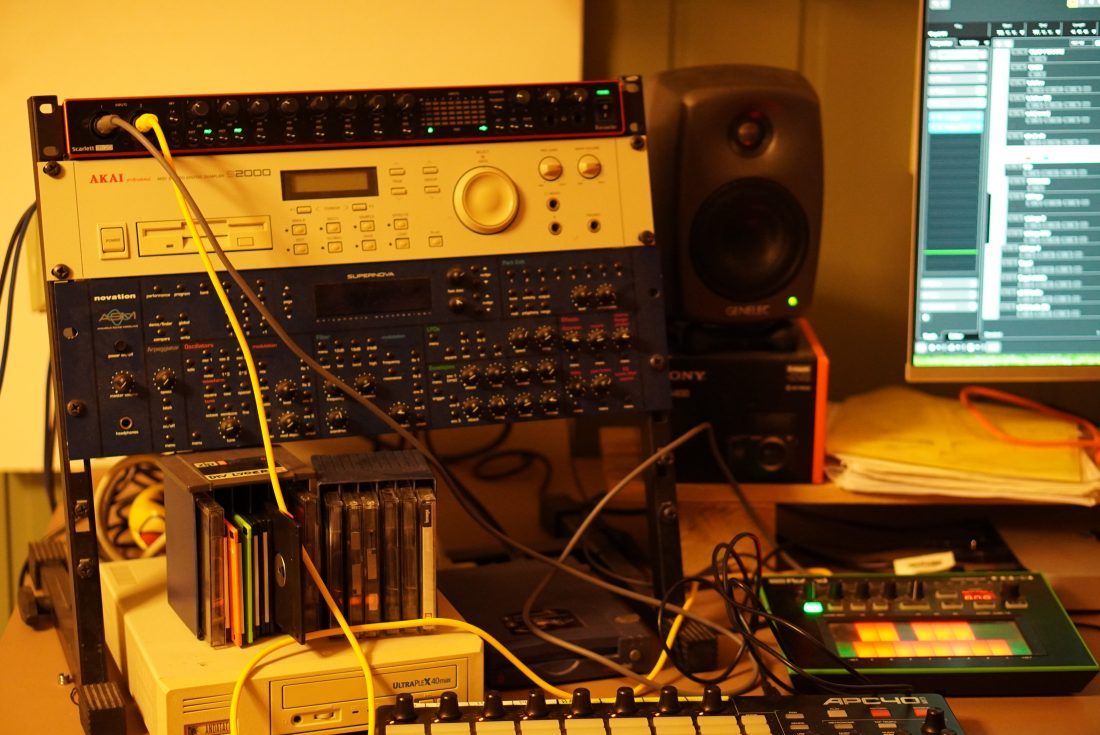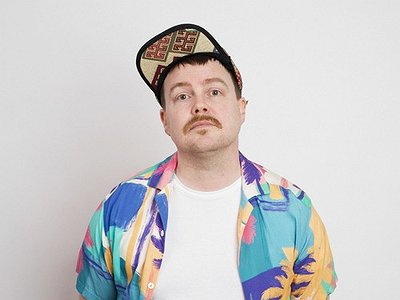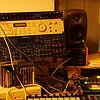Name: Håkon Vinnogg aka Vinny Villbass
Nationality: Norwegian
Occupation: Producer, DJ, concert organiser
Current release: Vinny Villbass and Tomas Järmyr team up as LAFT for the debut LP of their debut, New Objectivity. The album is out March 3rd 2023 via badabing diskos.
Gear Recommendations: The Valhalla reverb plugins are amazing. And please just buy plenty of guitar pedals as they can make any cheap synth or drum machine sound great!
[Read our Tomas Järmyr interview]
If you enjoyed this interview with Vinny Villbass and would like to stay up to date with his music, visit him on Instagram, Facebook, and Soundcloud.
What was your first studio like?
The first club track I ever made was at my older brother's place in 1998. Me and my friends needed a signature track for our graduation bus (yes, Norwegian high school graduates actually drive around in red concept party-buses for a month to celebrate). Our bus was named after the classic western TV-serie Bonanza, so I sampled and produced a trance / progressive house edit of the opening melody.
My brother's studio was impressive at the time, with everything from 303 and 909 to synths like Nordlead, Juno106 and the Akai 5000 sampler. One year later, he helped me buy the little brother Akai 2000 and my life as a producer got a kick start. (see picture)
[Read our feature on the Juno 106]
How and for what reasons has your set-up evolved over the years and what are currently some of the most important pieces of gear for you?
I was mainly working with Cubase 3. The Akai2000 sampler, ZIP drives, a midi keyboard, and a Novation Supernova for many years, and it took some time before I had the courage to believe in my own ideas. I got stuck in the loops, which I know happens to most fresh producers.
But I actually still use all of this equipment in my setup today. 
Some see instruments and equipment as far less important than actual creativity, others feel they go hand in hand. What's your take on that?
For me, making music is divided into the creative phase and the production phase.
When I say “creative phase” I'm talking of the actual rhythmic and melodic creation. For me, this has always been very physical, by dimming the studio lights down and hitting the keyboards of my synths, programming drums on the fly, or even playing instruments like the guitar or shaking some weird percussion. It's the feeling in the room that creates the sketch.
When I say “production phase” I mean making the recording or musical idea sound good. For example changing the sound of the pad or solo synth, or putting fx on the recorded instruments. Turning a sketch into an interesting and fitting collage of sounds.
Of course, these two phases are sometimes intertwined. But no matter what kind of tools you use, I think it's important to reflect upon having a phase where you just let go and be creative, without thinking to much on the sound. My friend and producer Charlotte Bendiks has for many years been telling me to focus on “body music”, I think it's a very suitable and descriptive expression upon which every artist within electronic rhytmic club music should reflect.
A studio can be as minimal as a laptop with headphones and as expansive as a multi-room recording facility. Which studio situation do you personally prefer – and why?
It's always better to know how ONE synth works, fully, than trying to “save” your sound by buying new equipment all the time. For me, it's perfect to have a drum sequencer and 2 or 3 synths (with a different range) set up for the creative phase.
I often think of my instrument-park as The Beatles - the sequencer is the drummer, and the different synths are the bassist and guitarists ... and my sampler is Bez ... hehe
In the light of picking your tools, how would you describe your views on topics like originality and innovation versus perfection and timelessness in music? Are you interested in a “music of the future” or “continuing a tradition”?
When I moved to Berlin in 2009, I was, as a young Norwegian, very trend-based, even being part of the narrowminded expression of club culture. A small country is always more extreme and changeable than bigger countries and cities where a larger population results in more averaged statistics.
So when I started helping my good friend and legend Khan run the label “I'm Single”, I was constantly stressing and looking for the freshest and innovative sounds and did not yet understand how underground music in Germany had been based on long term research and development without the constant disturbance of hypes and trends.
To put it this way, if you play and perfectionize the cowbell sound for 60 years, it's gonna turn out pretty interesting! Khan taught me to relax and think bigger in terms of waves.
I no longer believe in trends being more innovative than music history. Don't believe the hype! Hehe ... It's just waves, coming, going, splitting, merging. Quality, simplicity and emotions will always win in the long run.
Most would regard recording tools like microphones and mixing desks as different in kind from instruments like keyboards, guitars, drums and samplers. Where do you stand on this?
Interaction. LAFT is built around the concept of mixing an electronic work flow with an acoustic one.
The art of making acoustic and electronic instruments meet without sounding too far apart is very complex, as you need to merge everything from rhythmic timing, the melodic sound palette and flow. Both me and Tomas (percussionist and member in LAFT) have learned a lot from constructing this album, turning improvisation of electronic and acoustic instruments into composition.
I think we succeeded ...
How would you describe the relationship between technology and creativity for your work? Using a recent piece as an example, how do you work with your production tools to achieve specific artistic results?
With a master degree in acoustics, im very mathematical about my approach to music and sounds, (sometimes a bit too mathematical) and therefore know that all digital technologies in music are efficient copies and manipulators of common acoustic sound sources.
It's all just complex waveforms in a humble frequency specter. Therefore my creative focus is always on the sound and not necessarily on using new technology to achieve these sounds.
Within a digital working environment, it is possible to compile huge archives of ideas for later use. Tell me a bit about your strategies of building such an archive and how you put these ideas and sketches to use.
Definitely, and I think It's important to give your future music a greater thought and concept on sound before creating for example an EP or an album.
Ask yourself, what instruments (sounds) can you limit yourself to before you start. Collecting sounds and recordings into archives before starting can help this process.
How do you retain an element of surprise for your own work – are there technologies which are particularly useful in this regard?
Finding a balance here is for me personally the most difficult part in producing house music.
On one hand I'm afraid these surprises will remove the meditative importance of the tracks. But on the other hand I'm a very restless person that tends to include a bit too many surprises being afraid that a constant loop grows boring.
Trusting in technology in itself tends to make things boring. So acoustic progress - even if the music is repetitive - is my personal preference.
Production tools can already suggest compositional ideas on their own. How much of your music is based on concepts and ideas you had before entering the studio, how much of it is triggered by equipment, software and apps?
I very rarely get triggered by random generators and computer processed ideas. There's no need to ...
Have there been technologies which have profoundly changed or even questioned the way you make music?
Well, I was initially baffled once Ableton moved the visuality from timeline-based to loopbased production. But after some time I noticed in an overabundance of ableton-produced music that it tends to get too loopy and without soul and no inclination for progress. It's kinda like everything sounds “good” but nothing sounds „GOOD“ ...
Of course you have endless possibilities with Ableton and there are many exceptions, like the amazing productions by Four Tet. But in general I think many of today's new producers have a lot to learn by going off the timeline for a while and thinking “forrest run” rather than “treadmill”.
To some, the advent of AI and 'intelligent' composing tools offers potential for machines to contribute to the creative process. Do you feel as though technology can develop a form of creativity It'self? Is there possibly a sense of co-authorship between yourself and your tools?
In human rights you have a paragraph on Freedom of thought.
“All persons have the right to think freely, and to entertain ideas and hold positions based on conscientious or religious or other beliefs.”
AI challenges this right by intervening all sides of your life. AI can actually tell, by using camera and picture databases, if a person is gay, jewish, communist, rich, muslim, poor, buddhist etc. with greater accuracy than humans. This fact scares me a lot.
So letting AI intervene our souls by creating muzak deserves a greater discussion than the naive belief in the technological future we see nowadays in the Western world.
What tools/instruments do you feel could have a deeper impact on creativity but need to still be invented or developed?
Give me an underwater drum machine please!!





